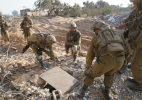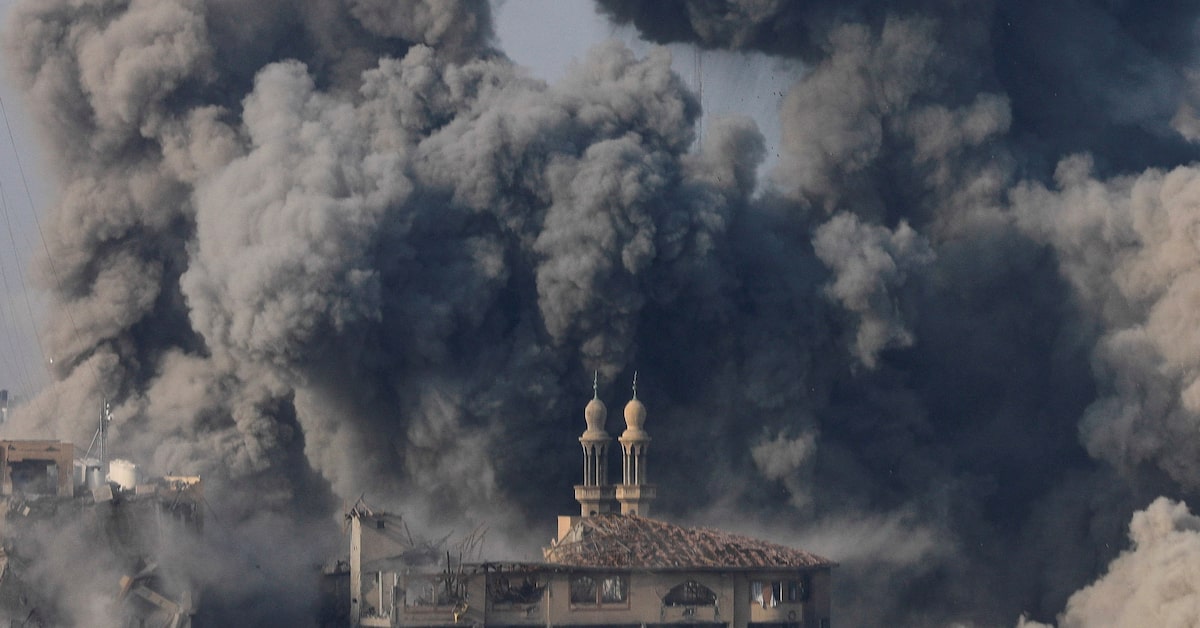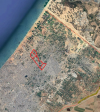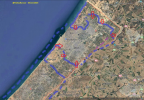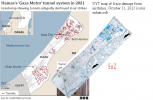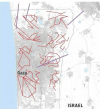Antares
Respected Leader
Michael A. Horowitz lyhyt analyysi Nasrallahin puheesta: tiivistetysti kaikki nämä numeroidut kohdat sanovat että Hezbollahilla ei ole halua suurempaan sotaan Israelin kanssa.
Toki puheessa toistettiin ne samat aikaisemmin kuullut "punaiset rajat" eli Hamasin täydellinen tuho tai Israelin hyökkäys Libanoniin, jotka sitten "pakottaisivat osallistumaan".
Minun arvio: Hamas saa tosiaan kuolla yksin. Hezbollah tai Iran ei lähde sotaan Gazan takia. Vaikka Israel hävittäisi Gazan maantasalle ja täyttäisi tunnelit vedellä, aina voidaan väittää että "Hamas selvisi hengissä, kaikesta huolimatta" mikä jättää takaportin auki - ei tarvetta osallistua, koska "Hamasia ei kyetty tuhoamaan".
Here is a bit of analysis on the Nasrallah speech
There are clear signs that point to Hezbollah's reluctance to enter the conflict, through a number of rhetorical points:
1. Nasrallah claims the Palestinians, Gaza and Hamas are strong, He says the October 7 attacks have shown Israel's weakness, repeating a known Iranian argument that the Israeli society is "weak like a spider web". The point is to suggest Hezbollah does not need to intervene.
2. Nasrallah says Hezbollah and the "Axis of Resistance" was not involved in the October 7 attacks, that this was "100%" Palestinian and shrouded in secrecy. He says multiple time that the "resistance" was surprised - but in a good way of course. This distances Hezbollah and Iran from the attacks, and explains why Hezbollah did not escalate immediately.
3. He is trying to portray Hezbollah as already involved, from day 1 (day 2, to be precise).
4. He says Hezbollah's attacks have forced Israel to divert around half of its military towards Lebanon, saying that otherwise those forces would be directed at Gaza. This is a way to say that the mere escalation along the border in Lebanon is already helping Gaza - so no need for more.
5. He is exaggerating the scope of the attacks - a trend we (@LeBeckInt) already picked up on a few days ago, claiming that Hezbollah is carrying out a massive campaign of attack that has not been seen even in 2006. This comes as Hezbollah also made claims that are likely inaccurate, like the claim that it killed or wounded "120 Israeli soldiers" or the claim yesterday that it hit 19 military outposts at once. Nasrallah also said that if you are not along the border, you wouldn't know - another way to lower the pressure on the group to escalate. He claims that Hezbollah has established "deterrence" and that Israel is forced to be very calculated. That's true - but Israel also never had such an opportunity to take shots at Hezbollah. If you ask me, it's a good trade for Israel.
6. He is deflecting the blame onto the US, which he portrays as the real power behind the war in Gaza. This is in line with Iran's long-time narrative (little Satan, Great Satan), and more specifically in line with Iranian speeches over the past two weeks, which have seen Tehran start to blame Washington for Israel's action. These speeches marked the beginning of a campaign of attacks against the US. I have mentioned why I thought Iran took that decision namely because it feels the risk of a US response is lower/ Washington is less unpredictable than Israel at this moment.
He also leaves "all the option open" and gives some of his red lines, which seems to be Hamas's defeat, as well as "Zionists actions in Lebanon". That's broad, and meant to keep Israel on its toes. But we now know a bit more what the "rules of the game" are - which is not a bad thing.
Toki puheessa toistettiin ne samat aikaisemmin kuullut "punaiset rajat" eli Hamasin täydellinen tuho tai Israelin hyökkäys Libanoniin, jotka sitten "pakottaisivat osallistumaan".
Minun arvio: Hamas saa tosiaan kuolla yksin. Hezbollah tai Iran ei lähde sotaan Gazan takia. Vaikka Israel hävittäisi Gazan maantasalle ja täyttäisi tunnelit vedellä, aina voidaan väittää että "Hamas selvisi hengissä, kaikesta huolimatta" mikä jättää takaportin auki - ei tarvetta osallistua, koska "Hamasia ei kyetty tuhoamaan".
Here is a bit of analysis on the Nasrallah speech
There are clear signs that point to Hezbollah's reluctance to enter the conflict, through a number of rhetorical points:
1. Nasrallah claims the Palestinians, Gaza and Hamas are strong, He says the October 7 attacks have shown Israel's weakness, repeating a known Iranian argument that the Israeli society is "weak like a spider web". The point is to suggest Hezbollah does not need to intervene.
2. Nasrallah says Hezbollah and the "Axis of Resistance" was not involved in the October 7 attacks, that this was "100%" Palestinian and shrouded in secrecy. He says multiple time that the "resistance" was surprised - but in a good way of course. This distances Hezbollah and Iran from the attacks, and explains why Hezbollah did not escalate immediately.
3. He is trying to portray Hezbollah as already involved, from day 1 (day 2, to be precise).
4. He says Hezbollah's attacks have forced Israel to divert around half of its military towards Lebanon, saying that otherwise those forces would be directed at Gaza. This is a way to say that the mere escalation along the border in Lebanon is already helping Gaza - so no need for more.
5. He is exaggerating the scope of the attacks - a trend we (@LeBeckInt) already picked up on a few days ago, claiming that Hezbollah is carrying out a massive campaign of attack that has not been seen even in 2006. This comes as Hezbollah also made claims that are likely inaccurate, like the claim that it killed or wounded "120 Israeli soldiers" or the claim yesterday that it hit 19 military outposts at once. Nasrallah also said that if you are not along the border, you wouldn't know - another way to lower the pressure on the group to escalate. He claims that Hezbollah has established "deterrence" and that Israel is forced to be very calculated. That's true - but Israel also never had such an opportunity to take shots at Hezbollah. If you ask me, it's a good trade for Israel.
6. He is deflecting the blame onto the US, which he portrays as the real power behind the war in Gaza. This is in line with Iran's long-time narrative (little Satan, Great Satan), and more specifically in line with Iranian speeches over the past two weeks, which have seen Tehran start to blame Washington for Israel's action. These speeches marked the beginning of a campaign of attacks against the US. I have mentioned why I thought Iran took that decision namely because it feels the risk of a US response is lower/ Washington is less unpredictable than Israel at this moment.
He also leaves "all the option open" and gives some of his red lines, which seems to be Hamas's defeat, as well as "Zionists actions in Lebanon". That's broad, and meant to keep Israel on its toes. But we now know a bit more what the "rules of the game" are - which is not a bad thing.

